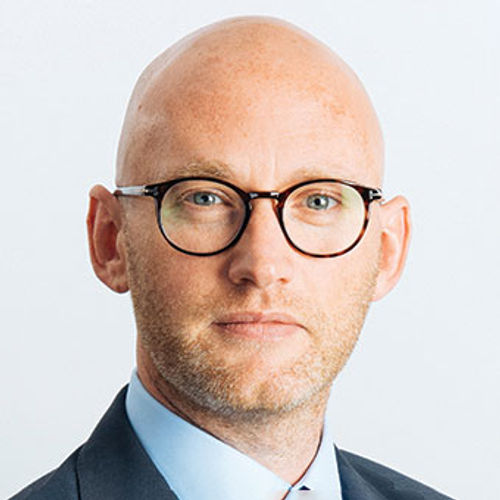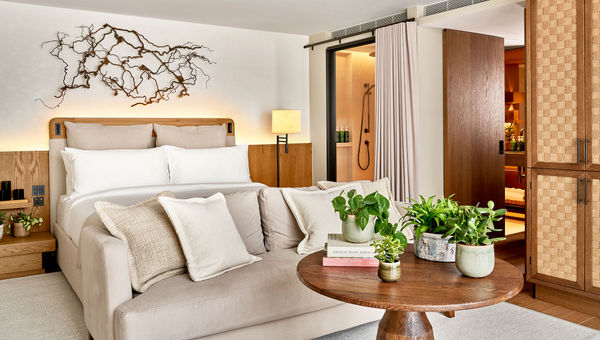London certainly has no shortage of posh hotels, but an influx of high-end openings is poised to catapult the city's luxury sector to new heights.
In the latter half of this year alone, London is preparing to welcome the Raffles London at the OWO, the Peninsula London and the Mandarin Oriental Mayfair, which will be the second Mandarin Oriental in the city.
That's on the heels of the eco-conscious 1 Hotels making its European debut this spring: It chose to plant its flag in London's Mayfair neighborhood.
And even more luxury inventory is coming down the pipeline. Six Senses, Waldorf Astoria, Rosewood, Park Hyatt, St. Regis, Oberoi, Alila and Langham all have plans for London hotels to open over the next few years. Mandarin Oriental has even made plans for a third London outpost, on the city's South Bank, by 2028.

Thomas Emanuel
Thomas Emanuel, a London-based senior director at STR, called such an extensive roster of luxury openings "a bit of an anomaly" in a market like London's. This level of rapid high-end expansion is more typically seen in newer or developing global hub markets like Dubai or Riyadh and Jeddah in Saudi Arabia, he said.
"This is quite unusual for a very established market that has been a global hub for many, many years, like a Paris, New York or Tokyo," he said. "The pipeline is significant, and it's really a 'who's who' of not just luxury but top-end luxury lodging."
London is a bucket-list destination
Part of London's appeal for luxury development is its healthy demand mix. The city attracts ample corporate, group, conference and leisure travel and enjoys strong connectivity, Emanuel said, adding that the city is "always on people's bucket list."
And the flurry of high-end investment comes as London's luxury hospitality sector makes solid progress on pandemic recovery with exceptionally robust rate growth helping to offset more modest occupancy gains.
According to STR data, London's ADR is 36.7% higher this year than in 2019.
"That's far outstripping inflation, and luxury rates recovered far more quickly than other classes," said Emanuel. "Luxury has really been leading the rate charge."
Although Emanuel said that London's high rates have potentially started to hit a ceiling, they don't look likely to drop any time soon.
"We expect small growth or for things to flatten, but the rates that we're achieving now are here to stay," he added.
Martine de Geus, director of marketing and communications at the Beaumont hotel in Mayfair, said that London's high-end hospitality sector has enjoyed relatively high demand this summer.
"Our June has been extraordinary, and our July has also been looking pretty strong," said de Geus. "The market has been incredibly buoyant."
The 72-room luxury property is in the midst of an expansion; it recently acquired a nearby building that will soon house 31 rooms after an extensive refurbishment. The project, on track to be fully finished by the holiday season, follows a propertywide revamp that included an extensive refresh of the Beaumont's ground-floor public spaces and guestrooms.
With these updates, de Geus said the Beaumont is even better-positioned to compete for upscale travelers as London's luxury sector gets significantly more crowded.

A guestroom at the 1 Hotel Mayfair. Photo Credit: 1 Hotels
"We have a very distinct niche in the market," said de Geus. "I'm sure people will want to check out the Peninsula and the Raffles and so forth. But they are all big brands at the end of the day. We have that 'grand hotel' [feeling], but we remain a small, intimate property, and there's an audience that wants that."
De Geus said that London's busy events calendar will help keep luxury demand high, citing annual happenings like the Wimbledon tennis tournament, the Frieze Art Fair and the London Design Festival.
Sam Jones, director of sales and marketing for the Nobu Hotel London Portman Square, which opened as London's second Nobu hotel in 2020, similarly believes there's plenty of demand to go around.
"London's really busy these days," Jones said. "And people are staying longer. In my experience, the average length of stay for most London hotels [prepandemic] was maybe two nights. But we're seeing an average length of stay of more than three nights now."
Meanwhile, STR's Emanuel views the city's spike in high-end hotel investment and expansion as "a vote of confidence" in London's future.
"These are developers and brands that know what they're doing, and they want to open in markets where they believe they can make money," said Emanuel. "And London is one of those few truly global cities that will always have a plethora of demand drivers."